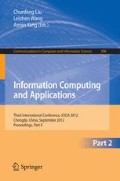Abstract
Circular regulation is an important law of bionomics. Simulated annealing genetic algorithm is an effective method of improving genetic algorithm. Combining circular strategy with simulated annealing genetic algorithm efficiently, a novel simulated annealing genetic algorithm applying circular strategy is proposed. And it is justified according to schema evolution analysis and convergence analysis. It can not only assure the capability of global convergence, but also accelerate the evolution of colony and acquire the satisfactory global optimal solution.
Access this chapter
Tax calculation will be finalised at checkout
Purchases are for personal use only
Preview
Unable to display preview. Download preview PDF.
References
Wang, L.: Immune algorithm. Chinese Journal of Electronics 7(7), 74–78 (2000)
Wu, H.: Based on simulated annealing mechanism is the multigroup parallel genetic algorithm. Journal of Software 11(3), 416–420 (2000)
Ling, J.: Based on the diversity of the niching technique antibody generating algorithm. Chinese Journal of Electronics 8(8), 1130–1133 (2003)
Lai, X.: Based on the principle of infiltration transfer strategy parallel genetic algorithm. Journal of Computer 7(7), 1146–1152 (2005)
Wang, Y.: Computational intelligence information processing technology and its application. Hunan University Press, ChangSha (1999)
Holland, J.H.: Genetic algorithms. Scientific American 266(4), 44–50 (1992)
Rudolph, J.: Convergence analysis of canonical genetic algorithms. IEEE Trans. on Neural Networks 5(1), 96–101 (1994)
Lin, F.-T., Kao, C.-Y.: Applying the genetic approach to simulated annealing in solving some NP-hard problems. IEEE Transactions on SMC 23(6), 1752–1767 (1993)
Yang, J.-A.: Multi-Universe Parallel Quantum Genetic Algorithm and Its Application to Blind Source Seperation. IEEE (2003)
Han, B., Jiang, J., Gao, Y., Ma, J.: A Quantum Genetic Algorithm to Solve the Problem of Multivariate. In: Liu, C., Chang, J., Yang, A. (eds.) ICICA 2011, Part I. CCIS, vol. 243, pp. 308–314. Springer, Heidelberg (2011)
Author information
Authors and Affiliations
Editor information
Editors and Affiliations
Rights and permissions
Copyright information
© 2012 Springer-Verlag Berlin Heidelberg
About this paper
Cite this paper
Bing, H., Junna, J., Xinchun, W. (2012). Circle-Based Improvement Strategy of Simulated Annealing Genetic Algorithm. In: Liu, C., Wang, L., Yang, A. (eds) Information Computing and Applications. ICICA 2012. Communications in Computer and Information Science, vol 308. Springer, Berlin, Heidelberg. https://doi.org/10.1007/978-3-642-34041-3_70
Download citation
DOI: https://doi.org/10.1007/978-3-642-34041-3_70
Publisher Name: Springer, Berlin, Heidelberg
Print ISBN: 978-3-642-34040-6
Online ISBN: 978-3-642-34041-3
eBook Packages: Computer ScienceComputer Science (R0)

